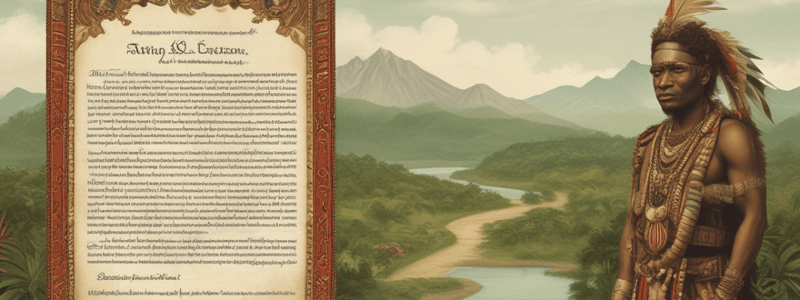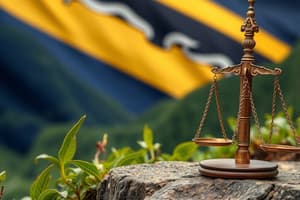Podcast
Questions and Answers
Which part of the Constitution of the Independent State of Papua New Guinea deals with the laws of the country?
Which part of the Constitution of the Independent State of Papua New Guinea deals with the laws of the country?
- Division 1 – The Laws of Papua New Guinea
- Division 4 – General
- Division 2 – Constitutional Laws (correct)
- Division 3 – Adoption, Reception and Development of Certain Laws
According to the Constitution, what is considered as the Supreme Law in Papua New Guinea?
According to the Constitution, what is considered as the Supreme Law in Papua New Guinea?
- Underlying law and pre-Independence statutes
- Constitution, etc., as Supreme Law (correct)
- Alterations of the Constitution
- Organic Laws
What is the purpose of Division 3 in the Constitution of Papua New Guinea?
What is the purpose of Division 3 in the Constitution of Papua New Guinea?
- Declaration of Loyalty
- Adoption, Reception and Development of Certain Laws (correct)
- National symbols
- Construction of written laws
Which part of the Constitution describes the process for making alterations to the Constitution and Organic Laws?
Which part of the Constitution describes the process for making alterations to the Constitution and Organic Laws?
What is emphasized in Division 1 of Part I in the Constitution?
What is emphasized in Division 1 of Part I in the Constitution?
In the Constitution, what is the role of Division 4 - General?
In the Constitution, what is the role of Division 4 - General?
What source of strength and origin of combined heritage does the Preamble of the Constitution acknowledge?
What source of strength and origin of combined heritage does the Preamble of the Constitution acknowledge?
What do the people of Papua New Guinea pledge themselves to guard and pass on to future generations?
What do the people of Papua New Guinea pledge themselves to guard and pass on to future generations?
Under whose guiding hand is the Independent State of Papua New Guinea declared, according to the Constitution's Preamble?
Under whose guiding hand is the Independent State of Papua New Guinea declared, according to the Constitution's Preamble?
What right do the people of Papua New Guinea invoke to establish their sovereign nation, according to the Constitution?
What right do the people of Papua New Guinea invoke to establish their sovereign nation, according to the Constitution?
What term is used in the Preamble to describe the unity of the people of Papua New Guinea?
What term is used in the Preamble to describe the unity of the people of Papua New Guinea?
What is the prescribed majority of votes needed for a proposed Organic Law to alter a provision of an Organic Law?
What is the prescribed majority of votes needed for a proposed Organic Law to alter a provision of an Organic Law?
In relation to any other proposed Organic Law, what is the prescribed majority of votes required?
In relation to any other proposed Organic Law, what is the prescribed majority of votes required?
If there are different prescribed majorities for different provisions of a proposed law, what is the prescribed majority of votes in relation to the law as a whole?
If there are different prescribed majorities for different provisions of a proposed law, what is the prescribed majority of votes in relation to the law as a whole?
Can different majorities be prescribed for different aspects or subject matters of a provision according to the section described?
Can different majorities be prescribed for different aspects or subject matters of a provision according to the section described?
Is there a restriction on requiring a greater majority of votes for the alteration of an Organic Law than that by which the first-mentioned law was made?
Is there a restriction on requiring a greater majority of votes for the alteration of an Organic Law than that by which the first-mentioned law was made?
What is the minimum majority required if no specific majority is prescribed by the Constitution for a proposed Organic Law?
What is the minimum majority required if no specific majority is prescribed by the Constitution for a proposed Organic Law?
What must happen when a person is arrested or detained according to the text?
What must happen when a person is arrested or detained according to the text?
In what circumstances should a person who is arrested or detained be brought before a court without delay?
In what circumstances should a person who is arrested or detained be brought before a court without delay?
What rights must a person be informed about immediately upon arrest or detention?
What rights must a person be informed about immediately upon arrest or detention?
If a person is detained for being brought before a court, can they be further held in custody without authorization?
If a person is detained for being brought before a court, can they be further held in custody without authorization?
What is a crucial right granted to a person who is arrested or detained according to the text?
What is a crucial right granted to a person who is arrested or detained according to the text?
What role does prompt notification of reasons for arrest play in protecting a person's rights?
What role does prompt notification of reasons for arrest play in protecting a person's rights?
What type of labour is required of a person while in lawful custody?
What type of labour is required of a person while in lawful custody?
In which situation can a person in custody be required to perform labour for care, treatment, rehabilitation, or welfare?
In which situation can a person in custody be required to perform labour for care, treatment, rehabilitation, or welfare?
What type of labour is specifically mentioned as being required from a member of a disciplined force?
What type of labour is specifically mentioned as being required from a member of a disciplined force?
Under what condition can labour be required as part of communal or civic duties?
Under what condition can labour be required as part of communal or civic duties?
What type of labour can be required in the national interest according to an Organic Law?
What type of labour can be required in the national interest according to an Organic Law?
In what situation might compulsory military service have an alternative form of required labour?
In what situation might compulsory military service have an alternative form of required labour?
Study Notes
Constitution of Papua New Guinea: Key Aspects
- The Constitution's section on laws establishes the framework and hierarchy for the legal system in Papua New Guinea.
- The Supreme Law in Papua New Guinea is defined as the Constitution itself, which supersedes all other laws.
- Division 3 outlines the procedures and guidelines for the enactment and amendment of Organic Laws within the country.
Alterations to the Constitution
- The process for making alterations to the Constitution and Organic Laws is detailed in a specific part of the Constitutional framework, ensuring legal continuity and order.
- Division 1 of Part I emphasizes the fundamental principles that underpin the nation, including sovereignty and rights of the citizens.
Role of Division 4
- Division 4 - General encompasses various provisions that apply broadly across different sections of the Constitution, ensuring coherent application of laws.
Significance of the Preamble
- The Preamble acknowledges the collective strength and cultural heritage of Papua New Guinea's diverse population, highlighting unity.
- The people pledge to preserve their cultural legacy, natural resources, and sovereignty for future generations.
- The Independent State of Papua New Guinea is declared under the guiding hand of a divine entity, reinforcing the significance of faith in governance.
Establishment of Sovereignty
- The right invoked by the people to establish their nation is rooted in self-determination and self-governance, reflecting their desire for independence.
- The unity of Papua New Guinea's people is described using terms that emphasize togetherness and communal identity.
Voting and Organic Laws
- A proposed Organic Law requires a prescribed majority of two-thirds of votes in Parliament to alter its provisions.
- For any other proposed Organic Laws, a simple majority is typically required unless specified otherwise.
- If different majorities are required for different provisions of a proposed law, a simple majority applies to the law as a whole.
- Different majorities can indeed be prescribed for various aspects of a provision, allowing for flexibility in legal amendments.
- No greater majority can be required for the alteration of an Organic Law than what was necessary for its original enactment.
Detention and Rights
- The Constitution mandates that an arrested or detained person be brought before a court without undue delay, upholding the right to a fair trial.
- Individuals arrested must be informed of their rights immediately, ensuring awareness of legal protections.
- A detained person cannot be held without proper authorization beyond the initial court appearance, safeguarding against unlawful detention.
- A crucial right granted includes legal representation, focusing on the protection of personal liberties.
Notification and Custodial Labour
- Prompt notification of arrest reasons plays a critical role in protecting individual rights and preventing arbitrary detention.
- Individuals in lawful custody may be required to perform certain labour, particularly related to their care or rehabilitation.
- Specific labour requirements may apply to members of disciplined forces under defined conditions.
- Communal or civic duties may invoke required labour, emphasizing public service to the nation.
- Certain situations enable compulsory military service to be supplemented by alternative forms of labour, reflecting flexibility in service obligations.
Studying That Suits You
Use AI to generate personalized quizzes and flashcards to suit your learning preferences.
Related Documents
Description
Test your knowledge on the Constitution of the Independent State of Papua New Guinea with questions covering topics like the preamble, national symbols, provinces, and declarations of loyalty. Get ready to explore the foundational document of Papua New Guinea!




